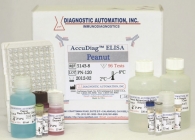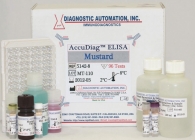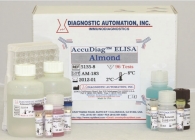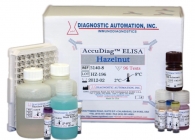
ELISA Kits
- • Anemia ELISA kits
- • Allergy ELISA kits
- • Autoimmune Disease kits
- • Bone Metabolism ELISA kits
- • Blood bank ELISA kits
- • Cancer ELISA kits
- • Cardiac Markers ELISA kits
- • Diabetes Assays ELISA kits
- • Drug test ELISA kits
- • Fertility ELISA kits
- • Food ELISA kits
- • Infectious Disease ELISA kits
- • Other ELISA Kits
- • Parasitology ELISA kits
- • Steroid ELISA kits
- • Thyroid ELISA kits
Rapid Tests
- • Allergy Rapid tests
- • Bone Metabolism
- • Cancer Rapid tests
- • Cardiac markers Rapid tests
- • Drug Tests
- • Fertility Rapid tests
- • Hepatitis Panel
- • Infectious Disease & other tests
- • Other
- • Ovulation Rapid tests
- • Pregnancy tests
- • Urine Reagent Strips tests
IFA Kits
Chemiluminescence Immuno Assays
- • Allergy Assays
- • Autoimmune Thyroid Assays
- • Cardio-Vascular Monitoring
- • Diabetes Assays
- • Fertility Assays
- • Growth Deficiency
- • Infectious Disease Assays
- • Others
- • Steroid Assays
- • Thyroid Assays
- • Tumor Marker Assays
Serology Tests
- • ASO (Anti-Streptolysin-O)
- • CRP (C-Reactive Protein)
- • Mono (Infectious Mononucleosis)
- • RF (Rheumatoid Factor)
- • RPR (Rapid Plasma Reagin)
- • SLE (Systemic Lupus Erythematosus)
Instrumentation



Walnut ELISA kit
| Name |
Walnut ELISA Test |
|---|---|
| Full name |
Food Walnut ELISA Test Kit |
| Test | 96 |
| Method | ELISA method: Enzyme Linked Immunosorbent Assay |
| Principle | ELISA principle- Peroxidase conjugated |
| Detection Range | Qualitative elisa assay- Positive, Negative Controls |
 |
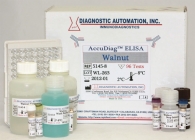 |
 |
Walnut ELISA kit description:
Diagnostic Automation Inc. offers a Walnut ELISA Kit that is an Enzyme Immunosorbent Assay for the Qualitative determination of Walnut in food. This Walnut ELISA Kit is a rapid Food Allergen ELISA test which is designed to provide a sensitive and convenient method for screening food samples for walnut residues.
Materials Provided with Walnut ELISA Kit:
1. Microtiter plate: 12 strips with 8 breakable wells coated with anti-walnut antibodies
2. Walnut Standards (0; 2; 6; 20; 60 ppm of walnut): 5 vials with 1.0 mL each
3. Conjugate (anti-walnut-peroxidase): 15 mL
4. Substrate Solution (TMB): 15 mL
5. Stop Solution (0.5 M H2SO4): 15 mL
6. Extraction and sample dilution buffer (Tris): 2 x
7. Washing Solution (PBS + Tween 20): 60 mL as 10x
8. Plastic bag to store unused microtiter strips.
9. Instruction Manual
Materials required but not provided:
1. Freshly distilled or deionized water
2. Dispensing system and/or pipette
3. EIA kit Microplate washer
4. EIA kit Microplate Reader with 450nm wavelength
Walnut ELISA Test Kit Background Information:
Walnut (Juglans regia) belongs to the walnut plants (Juglandaceae). With 15% the fraction of proteins in walnuts is high. Some of these proteins are known for being allergenic, such as rJug r 1 and rJug r 4. Many of them are heat resistant making them stable to different production processes. For this reason walnut represents an important food allergen. For walnut allergic persons, hidden walnut allergens in food are a critical problem. Already very low amounts of walnut can cause allergic reactions, which may lead to anaphylactic shock in severe cases. Because of this, walnut allergic persons must strictly avoid the consumption of walnuts or walnut containing food. Cross-contamination, mostly in consequence of the production process, is often noticed. The chocolate production process is a representative example. This explains why in many cases the presence of walnut residues in food cannot be excluded. For this reason sensitive detection systems such as this Walnut allergy test kit for walnut residues in foodstuffs are required.
Walnut ELISA Kit Test Principle:
The Walnut ELISA Kit is a quantitative test is based on the principle of the enzyme linked immunosorbent assay. An antibody directed against walnut proteins is bound on the surface of a microtiter plate provided in this Walnut ELISA Kit.
Diagnostic Automation Inc offers several popular Food Allergen ELISA Kits: Egg Protein Residue in Food ELISA Kit, Soy Protein Residue Detection in Food ELISA Kit, Lupine ELISA Kit, Mustard ELISA Kit, Peanut ELISA Kit, Soy ELISA Kit, Almond ELISA Kit, Gluten ELISA Kit, and Milk Protein Residue Detection in Food ELISA Kit. For more information on any of these Food ELISA Test Kits please see our website home page, or contact our Customer Service Representative at 818-591-3030.
When utilizing Diagnostic Automation, Inc. Walnut ELISA test kit, please note that due to high risk of cross-contamination all applied instruments like applicator, mortar, glass vials etc. have to be cleaned thoroughly before and after each sample. Walnut proteins adhere very strongly to different surfaces. To identify possible cross-contamination caused by previous extractions it is strongly recommended to note the sequence of the extractions. The limit of detection (LOD) of the DAI Walnut test is 0.35 ppm. The limit of quantification (LOQ) of the DAI Walnut test is 2 ppm. Due to the variety of sample matrices and their influence on the blank, results less than the LOQ should be treated as negative.
ELISA kits - Rapid tests- Drug tests- Pregnancy test - IFA kits - CLIA assays - Serology tests - Instrumentation
©1992 Diagnostic Automation/Cortez Diagnostics Inc. All rights reserved.












